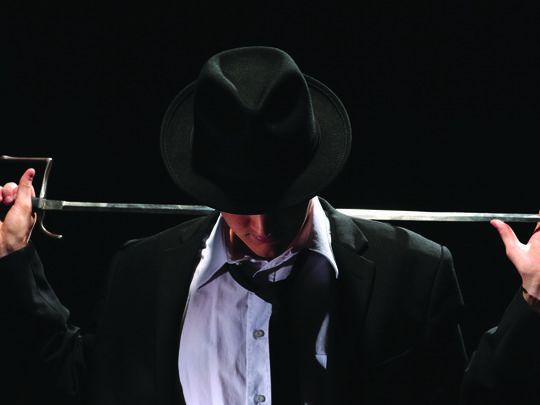Review by Doug Iden of Cabaret: Incline Theatre
 Willkommen! Bienvenue! Welcome! to the opening scene of the opening musical for the 2017-2018 season at the Warsaw Federal Incline Theater. Based upon Christopher Isherwood“™s Berlin Stories, Cabaret shows us the tawdry, unsettled world of early 1930“™s Berlin while the characters deal with the rise of Nazi Germany.
Willkommen! Bienvenue! Welcome! to the opening scene of the opening musical for the 2017-2018 season at the Warsaw Federal Incline Theater. Based upon Christopher Isherwood“™s Berlin Stories, Cabaret shows us the tawdry, unsettled world of early 1930“™s Berlin while the characters deal with the rise of Nazi Germany.
If your only exposure to Cabaret is the movie, you will notice a major difference between the play and the film. The movie was a star vehicle for Liza Minnelli with a prime concentration on the character of Sally Bowles while the play is more of an ensemble piece telling the stories of people living in a dilapidated rooming house. Because of the shift in emphasis to Sally Bowles in the film, composer John Kander and lyricist Fred Ebb wrote some new songs and eliminated other tunes written originally for the ensemble characters or used them as instrumentals only. Two new movie songs include the jazzy “œMein Herr“ and the gut-wrenching torch song “œMaybe This Time“. This production is an amalgam of the two versions including the previously mentioned songs plus reinstating some of the tunes from the original production. Consequently, there is a lot of music in this version, some of which you may not have heard before.
The action alternates between the rooming house and the sleazy nightclub called the Kit Kat Klub. The play opens with the Emcee (Matthew Wilson) and the Kit Kat boys and girls singing “œWillkommen“, a raucous, sexy number that sets the tone for the show. The Emcee is an amoral, asexual degenerate who represents the moral disintegration of German society. Wilson is marvelously obsequious as the nightclub host and is one of the highlights of the show. The gender-bending ensemble (Kate Stark, Samantha Cobb, Maddie Vaughn, Allison Evans, Michael Wright, Jameson Ward, Ben Goodman and Sam Johnson) cavort in raunchy fashion to the Bob Fosse-esque choreography of director/choreographer Angela Kahle in songs including “œDon“™t Tell Mama“, “œMein Herr“ “œMoney“ and the finale. The floorshow numbers act as commentaries on situations in the show.
Sally Bowles (Hannah Gregory), a hedonistic, transplanted Brit, is the featured singer at the Kit Kat Klub and becomes the primary focus of the play. Gregory is excellent as the flighty, naïve, shallow singer who cannot see beyond her ambition of singing in the club. Gregory belted her raunchy songs, poignantly mesmerized with “œMaybe This Time”, but sounded a little scratchy on the title song “œCabaret“.
The other principal character is Cliff Bradshaw (Rory Sheridan) a failed American writer who is in Berlin to finally finish his book. He meets Sally at the nightclub and she moves in with him when she loses her singing job. Sheridan effectively plays Bradshaw as rootless and only marginally less amoral than the other characters. For a while, it appears that his infatuation with Sally may help save both of them.
In the rooming house, we meet Fraulein Schneider (Helen Raymond-Goers) who owns the building and is barely eking out a living. She bemoans her frustration with life in “œSo What?“ but things may change when Herr Schultz (Jeff Richardson) proposes. Raymond-Goers treads a fine line as a “œnormal“ German pragmatically trying to cope with a difficult life while avoiding the oncoming Nazi horror. She and Shultz sing two delightful duets with “œIt Couldn“™t Please Me More“ and “œMarried“. However, another tenant (Ernst Ludwig played by Justin Glaser) discovers that Schultz is Jewish and, as a Nazi convert, causes dissention in the rooming house. Glaser and the company sing a chilling rendition of “œTomorrow Belongs to Me“ at the close of the first act. The play turns darker in the second act.
Music Director Michael Kennedy leads an unusually large on-stage band which complements the singers well without drowning them out. They play an excellent, jazzy version of “œCabaret“ at the Entr“™acte and during the finale. The set (designed by Brett Bowling) is very interesting because it depicts the decadent, shabby Kit Kat Klub with paint dripping on the steps and a faded wall. The dancers parade on the “œstage“ and cavort on various stairways. The apartment displays peeled concrete around the ill-painted doors and shoddy furniture.
The costuming by Caren Brady at times complements the shabby look of the set but, at times, shows the supposedly impecunious characters with exquisite clothing. Cliff, in particular, complains about money all the time but seems to be dressed to the nines. Sally has tattered stockings in one scene and then seems to be a model for Vogue in another. The gorilla costume, though, is very funny.
Denny Reed“™s lighting is also very interesting. At times, he uses side lights to project the dancers onto the walls of the theater which seems to increase the number of actors but also adds to the eeriness of the scene.
Caution: this play has adult themes and uses a lot of sexual movements, gender bending and innuendos.
I liked the production and recommend it highly. As the song says, go to the Cabaret, running through October 15 at the Warsaw Federal Incline Theater. For ticket information, call 513-241-6550. Their next production is Five Women Wearing the Same Dress.


